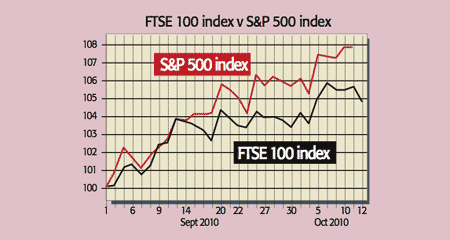Get the latest financial news, insights and expert analysis from our award-winning MoneyWeek team, to help you understand what really matters when it comes to your finances.
You are now subscribed
Your newsletter sign-up was successful
Want to add more newsletters?

Twice daily
MoneyWeek
Get the latest financial news, insights and expert analysis from our award-winning MoneyWeek team, to help you understand what really matters when it comes to your finances.

Four times a week
Look After My Bills
Sign up to our free money-saving newsletter, filled with the latest news and expert advice to help you find the best tips and deals for managing your bills. Start saving today!
"Don't fight the Fed" is the "mantra driving financial markets" now, say Michael Mackenzie and David Oakley in the FT. Major equity indices, along with other risky assets, have risen rapidly over the past few weeks since the Fed opened the door to another round of quantitative easing (QE) bond buying with printed money in order to shore up lending and growth.
Stocks got a further boost last week after yet another poor US employment report made more QE seem more likely. The Japanese and British central banks also look set to "add more punch to the bowl", says Danske Bank's Allan von Mehren.
But how long will this rally last? It's still not clear how big a new Fed asset-buying programme will be, so the market may be disappointed if the Fed doesn't come out with all guns blazing. But the more important question is whether it will work at all. The trouble is, some argue, that after a credit bubble, banks and consumers focus on paying debt down and are loath to lend or borrow more. So there is scant demand in the economy no matter how cheap or available credit becomes. As one businessman quoted on Investorsinsight.com put it: "I don't need more credit, I just need more customers."
MoneyWeek
Subscribe to MoneyWeek today and get your first six magazine issues absolutely FREE

Sign up to Money Morning
Don't miss the latest investment and personal finances news, market analysis, plus money-saving tips with our free twice-daily newsletter
Don't miss the latest investment and personal finances news, market analysis, plus money-saving tips with our free twice-daily newsletter

He'll probably have a long wait. David Rosenberg of Gluskin Sheff notes that the amount of consumer credit outstanding in the US has been on the slide since early 2008. But with household debt still historically high, this process looks likely to continue for a few more years. All this applies to many developed economies, which is why the first round of QE did nothing for sustainable growth. So "there is little reason to think that more of the same will have any other effect", says Capital Economics.
And that means there is likely to be a point when "investors' faith will start to waver if a second round of QE fails to make any difference... [then] equity prices could be vulnerable to a significant pull back". There's also the risk of a currency and trade war as QE drives down currencies. "A policy of boosting exports [through a weaker currency] can all too easily turn into a policy of blocking imports," says Buttonwood in The Economist. That wouldn't be good news for risky assets either.
Get the latest financial news, insights and expert analysis from our award-winning MoneyWeek team, to help you understand what really matters when it comes to your finances.
MoneyWeek is written by a team of experienced and award-winning journalists, plus expert columnists. As well as daily digital news and features, MoneyWeek also publishes a weekly magazine, covering investing and personal finance. From share tips, pensions, gold to practical investment tips - we provide a round-up to help you make money and keep it.
-
 Should you buy an active ETF?
Should you buy an active ETF?ETFs are often mischaracterised as passive products, but they can be a convenient way to add active management to your portfolio
-
 Power up your pension before 5 April – easy ways to save before the tax year end
Power up your pension before 5 April – easy ways to save before the tax year endWith the end of the tax year looming, pension savers currently have a window to review and maximise what’s going into their retirement funds – we look at how

